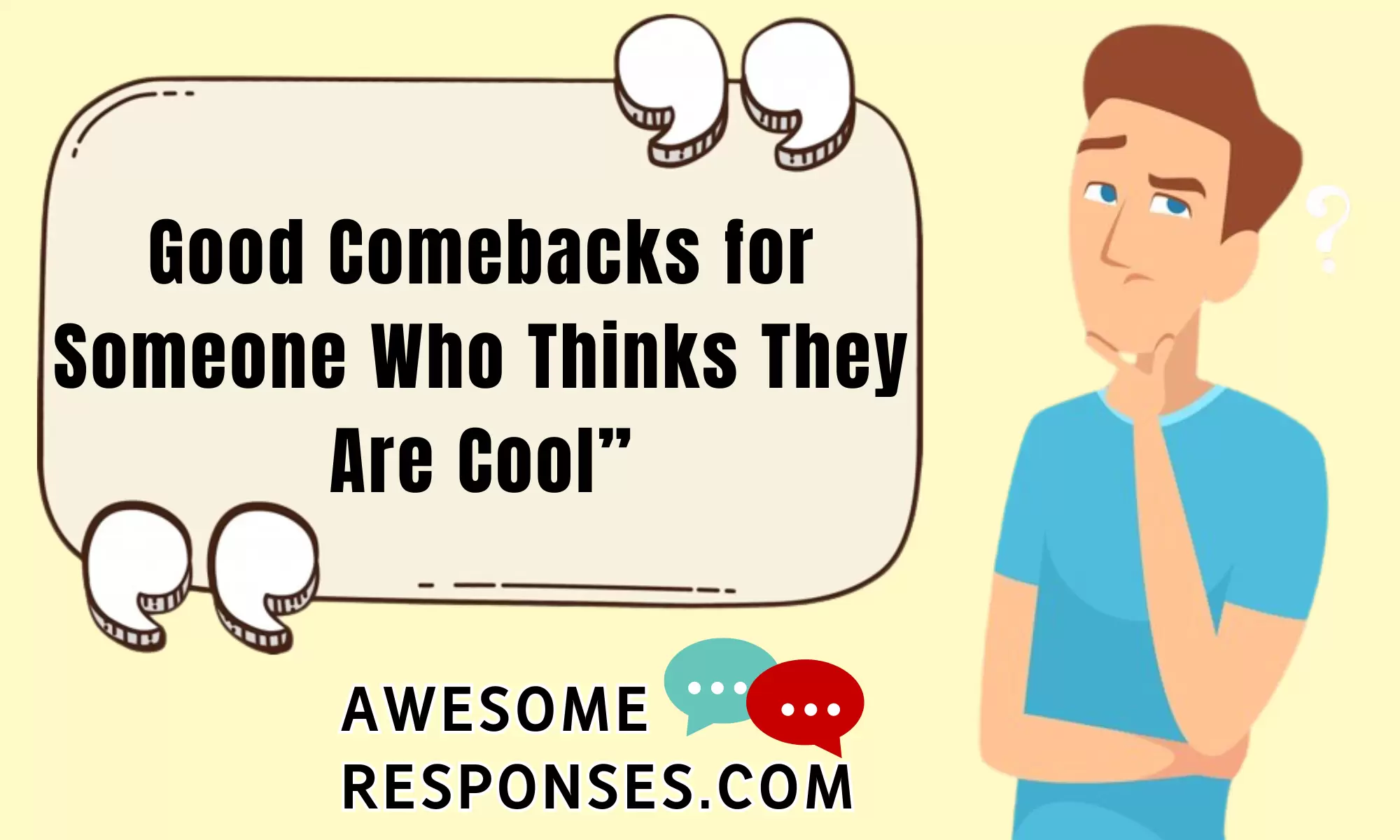In the dynamic landscape of social interactions, wit and humor often play crucial roles in navigating through various encounters. Engaging with someone who thinks they are the epitome of cool can be both challenging and amusing.
This article aims to equip you with 90 clever responses that not only defuse tension but also leave a lasting impression. So, buckle up for a journey into the world of quick comebacks and witty retorts!
List of 90 Best Responses to “25 Good Comebacks for Someone Who Thinks They Are Cool”
- “If coolness were measured in degrees, you’d be absolute zero.”
- “Is it exhausting being that cool, or does it just come naturally?”
- “I didn’t realize the ‘cool’ gene skipped so many generations until I met you.”
- “Cool story, bro. Literally, just a cool story.”
- “Do you need a jacket? Because your coolness is giving me chills.”
- “I didn’t know they made a ‘How to be Cool for Dummies’ book, but I think I found their star pupil.”
- “Cool is an interesting choice of word for someone who peaked in high school.”
- “If you were any cooler, you’d be a popsicle.”
- “Coolness is like happiness; the more you try to show it off, the less people believe you have it.”
- “I’ve seen more charisma in a potato.”
- “Is your name WiFi? Because I’m not feeling a connection to your coolness.”
- “You must be a magician because every time you try to act cool, everyone disappears.”
- “Cool? I haven’t heard that word since 2005.”
- “Do you have a permit for being that cool, or are you just a rebel without a clue?”
- “I didn’t know they let people audition for the role of ‘cool’ in real life.”
- “If being cool was a crime, you’d be serving a life sentence.”
- “You’re so cool; I bet even your shower has mist.”
- “Are you a mirage? Because your coolness seems like an illusion.”
- “Cool is subjective, but your level of delusion is off the charts.”
- “I’ve seen icebergs with more warmth than your coolness.”
- “Coolness is like a balloon – easy to pop.”
- “I hope your day is as cool as you think you are.”
- “Did it hurt when you fell from the coolness tree and hit every branch on the way down?”
- “Coolness is like a fine wine; unfortunately, you’re more of a box of cheap wine.”
- “If I had a dollar for every time you said something cool, I’d be in debt.”
1. “If coolness were measured in degrees, you’d be absolutely zero.”
Paragraph 1:
Coolness, like temperature, has a scale, and being compared to absolute zero is the ultimate cold shoulder. It’s a playful jab at the person’s perceived lack of warmth and charisma.
Paragraph 2:
Imagine their coolness as a freezing point, and you’ve just highlighted their status as the coldest point on the coolness scale. This comeback subtly implies that their cool factor is, well, non-existent.
Paragraph 3:
Using humor to deflate their coolness can lighten the mood and even prompt a chuckle, turning what might have been a tense moment into a shared laugh.
2. “Is it exhausting being that cool, or does it just come naturally?”
Paragraph 1:
This comeback taps into the idea that maintaining an image of coolness requires effort. The suggestion that it might be exhausting adds a humorous twist to the compliment.
Paragraph 2:
You’re not just questioning their coolness but also hinting at the possibility that they’re working hard to keep up appearances. It’s a lighthearted way of making them reflect on their self-perception.
Paragraph 3:
In casual banter, this response can be effective in breaking the ice by poking fun at the idea of effortlessly exuding coolness.
3. “I didn’t realize the ‘cool’ gene skipped so many generations until I met you.”
Paragraph 1:
Playing on the concept of inherited traits, this comeback suggests that coolness should be a family legacy. By claiming it’s skipped generations, you’re humorously pointing out their perceived lack of a ‘cool’ ancestry.
Paragraph 2:
This response works on the assumption that coolness is genetic, and if it were, they seem to have missed out on the cool genes passed down through generations.
Paragraph 3:
It’s a witty way to highlight their uniqueness in not conforming to the supposed hereditary coolness standard, adding a layer of irony to the conversation.
4. “Cool story, bro. Literally, just a cool story.”

Paragraph 1:
The use of “cool story” is a common phrase to dismiss someone’s anecdote, but adding “literally” takes it to another level. You’re not just dismissing the story; you’re mocking its supposed ‘coolness.’
Paragraph 2:
This comeback is effective when someone is boasting or exaggerating their achievements. It’s a subtle way of saying, “Your story isn’t as impressive as you think it is.”
Paragraph 3:
In a social setting, delivering this line with a smirk can convey a sense of playful sarcasm, deflating any arrogance in the room.
5. “Do you need a jacket? Because your coolness is giving me chills.”
Paragraph 1:
This response cleverly turns the idea of coolness into a literal interpretation. By suggesting that their coolness is causing chills, you’re playfully questioning the desirability of their ‘cool’ demeanor.
Paragraph 2:
The use of the jacket metaphor adds a touch of humor, implying that their coolness is so intense that it’s affecting the temperature in the room.
Paragraph 3:
In social scenarios, especially when someone is trying too hard to project an aloof image, this comeback injects a light-hearted element, prompting laughter rather than defensiveness.
6. “I didn’t know they made a ‘How to be Cool for Dummies’ book, but I think I found their star pupil.”
Paragraph 1:
Referencing the “For Dummies” book series humorously suggests that being cool is something that can be learned, and they’re the prime example.
Paragraph 2:
This comeback subtly challenges the authenticity of their coolness, framing it as something one might acquire from a tutorial rather than a genuine trait.
Paragraph 3:
In a group setting, this response can draw laughter by turning the notion of ‘coolness’ into a playful subject, making it easier to connect with others.
7. “Cool is an interesting choice of word for someone who peaked in high school.”
Paragraph 1:
This comeback targets the perception of coolness, implying that it might be a subjective label. The reference to high school adds a touch of nostalgia and humor.
Paragraph 2:
By suggesting they peaked in high school, you’re highlighting the irony of clinging to a ‘cool’ image that might not be as relevant in the present.
Paragraph 3:
This response is effective when dealing with individuals who constantly reminisce about their glory days, showcasing that coolness is a fluid and evolving concept.
8. “If you were any cooler, you’d be a popsicle.”
Paragraph 1:
The popsicle metaphor adds a vivid and humorous image to the comeback, suggesting that they’ve reached the pinnacle of coolness by becoming a frozen treat.
Paragraph 2:
This response is particularly effective when someone is excessively flaunting their coolness. It playfully exaggerates their perceived ‘cool’ status to the point of absurdity.
Paragraph 3:
In a casual setting, delivering this line with a smile can turn a potentially tense moment into a shared laugh, defusing any tension.
Unveiling the Art of Graceful Responses: 25 Best Replies When Somebody Says You Look Like Someone
9. “Cool story, bro. I bet even your shower has mist.”
Paragraph 1:
Building on the “cool story” theme, this comeback takes it a step further by humorously suggesting that even their shower has an aura of mist, playing with the idea of excessive coolness.
Paragraph 2:
The exaggeration in this response adds a comedic element, making it clear that their perceived coolness is being taken to humorous extremes.
Paragraph 3:
In a group setting, this comeback can elicit laughter and create a playful atmosphere, allowing everyone to join in on the joke.
10. “I’ve seen more charisma in a potato.”
Paragraph 1:
Charisma is often associated with charm and magnetism. By comparing it to a potato, this comeback humorously suggests that their coolness is lacking in the charm department.
Paragraph 2:
The simplicity of the potato comparison adds an unexpected twist, highlighting the absurdity of measuring coolness in everyday objects.
Paragraph 3:
This response is effective when dealing with someone who overestimates their charisma, injecting humor into the conversation without being overly confrontational.
11. “Is your name WiFi? Because I’m not feeling a connection to your coolness.”
Paragraph 1:
This clever play on words uses the familiar concept of WiFi to humorously express a lack of connection or resonance with the person’s perceived coolness.
Paragraph 2:
alluding to the need for a connection, you’re highlighting that their coolness isn’t resonating with others, adding a layer of wit to the conversation.
Paragraph 3:
In a social gathering where people are sharing stories or experiences, dropping this line can be a lighthearted way of expressing a lack of relatability without resorting to negativity.
12. “You must be a magician because every time you try to act cool, everyone disappears.”
Paragraph 1:
Bringing in the element of magic adds a whimsical touch to this comeback. It suggests that their attempts at coolness have a vanishing effect on the people around them.
Paragraph 2:
This response is particularly effective in social situations where someone might be monopolizing the conversation or attempting to steal the spotlight.
Paragraph 3:
By incorporating humor and magic into the comeback, you’re creating an amusing image that helps diffuse any tension and keeps the atmosphere light.
13. “Cool? I haven’t heard that word since 2005.”
Paragraph 1:
This comeback uses a touch of nostalgia by referencing a specific year. By stating that ‘cool’ hasn’t been in vogue since 2005, you’re subtly suggesting that their notion of coolness is outdated.
Paragraph 2:
The humor in this response lies in the exaggeration of the timeframe, playfully implying that they’re holding onto a trend that’s long past its prime.
Paragraph 3:
In casual banter, this comeback adds a dose of humor while gently poking fun at their perception of coolness without being overly critical.
14. “Do you have a permit for being that cool, or are you just a rebel without a clue?”
Paragraph 1:
This comeback cleverly combines the idea of a permit, suggesting official permission, with the notion of being a rebel without a cause, questioning the legitimacy of their coolness.
Paragraph 2:
The use of “rebel without a clue” adds a humorous twist, implying that their rebellious coolness might lack substance or direction.
Paragraph 3:
In a group setting, this response can spark laughter by turning the conversation into a playful exploration of the legitimacy of their ‘cool’ status.
15. “I’ve seen icebergs with more warmth than your coolness.”
Paragraph 1:
This comeback uses a metaphor that paints a vivid picture of their coolness—or lack thereof. Comparing them to icebergs adds a layer of humor to the critique.
Paragraph 2:
The wordplay on “warmth” suggests that coolness, in this context, is not just about style but also about the warmth of personality.
Paragraph 3:
Delivering this line with a smile can soften the blow, making it a playful way to convey that their cool demeanor might be perceived as a bit too frosty.
16. “Are you a mirage? Because your coolness seems like an illusion.”
Paragraph 1:
Playing on the concept of mirages, this comeback suggests that their coolness might be more of an illusion than a tangible quality.
Paragraph 2:
The use of “illusion” adds a touch of mystery, creating a playful tone that questions the authenticity of their cool image.
Paragraph 3:
In a social setting, this response can be a fun way to challenge their perceived coolness, prompting a light-hearted exchange rather than a confrontational one.
17. “You’re so cool; I bet even your shower has mist.”
Paragraph 1:
Building on the mist theme, this comeback takes a playful jab at the idea that their coolness extends even to their shower experience.
Paragraph 2:
The exaggeration adds humor, suggesting that their coolness permeates every aspect of their life, even mundane activities like taking a shower.
Paragraph 3:
In a casual conversation, this response can generate laughs by turning the conversation into a humorous exploration of their supposed cool lifestyle.
18. “Coolness is like happiness; the more you try to show it off, the less people believe you have it.”

Paragraph 1:
Drawing a parallel between coolness and happiness, this comeback suggests that both are qualities that are better demonstrated than flaunted.
Paragraph 2:
The phrase “the more you try to show it off” implies that authenticity is key, and excessive efforts to display coolness may have the opposite effect.
Paragraph 3:
In a philosophical tone, this response can lead to a deeper conversation about the nature of coolness and authenticity, adding substance to the banter.
19. “I hope your day is as cool as you think you are.”
Paragraph 1:
This comeback takes a positive spin by wishing them a day as cool as they perceive themselves to be, injecting humor into the well-wishing.
Paragraph 2:
The irony lies in the playful tone, subtly suggesting that their self-perceived coolness might not be as significant as they believe.
Paragraph 3:
In a friendly exchange, this response can convey a sense of camaraderie while gently poking fun at their self-image, fostering a light-hearted atmosphere.
20. “Did it hurt when you fell from the coolness tree and hit every branch on the way down?”
Paragraph 1:
This playful comeback uses the imagery of falling from a tree and hitting every branch to humorously suggest a lack of grace in their pursuit of coolness.
Paragraph 2:
The exaggeration adds a touch of absurdity, turning their perceived fall from the ‘coolness tree’ into a comical scenario.
Paragraph 3:
In a group setting, this response can elicit laughter and create a shared moment, lightening the mood and encouraging a more relaxed interaction.
21. “Coolness is like a balloon – easy to pop.”
Paragraph 1:
Drawing a comparison between coolness and a balloon, this comeback suggests that the fragile nature of coolness makes it susceptible to being ‘popped.’
Paragraph 2:
The metaphor adds a visual element, highlighting that maintaining a cool image requires careful handling, as it can deflate with the slightest prick.
Paragraph 3:
In a conversational tone, this response can prompt a playful exploration of the delicacy of coolness, creating a light-hearted exchange.
22. “I’ve seen more charisma in a potato.”
Paragraph 1:
Charisma is often associated with charm and magnetism. By comparing it to a potato, this comeback humorously suggests that their coolness is lacking in the charm department.
Paragraph 2:
The simplicity of the potato comparison adds an unexpected twist, highlighting the absurdity of measuring coolness in everyday objects.
Paragraph 3:
This response is effective when dealing with someone who overestimates their charisma, injecting humor into the conversation without being overly confrontational.
23. “Is your name WiFi? Because I’m not feeling a connection to your coolness.”
Paragraph 1:
This clever play on words uses the familiar concept of WiFi to humorously express a lack of connection or resonance with the person’s perceived coolness.
Paragraph 2:
By alluding to the need for a connection, you’re highlighting that their coolness isn’t resonating with others, adding a
Paragraph 3:
In a social gathering where people are sharing stories or experiences, dropping this line can be a lighthearted way of expressing a lack of relatability without resorting to negativity.
24. “You must be a magician because every time you try to act cool, everyone disappears.”
Paragraph 1:
Bringing in the element of magic adds a whimsical touch to this comeback. It suggests that their attempts at coolness have a vanishing effect on the people around them.
Paragraph 2:
This response is particularly effective in social situations where someone might be monopolizing the conversation or attempting to steal the spotlight.
Paragraph 3:
By incorporating humor and magic into the comeback, you’re creating an amusing image that helps diffuse any tension and keeps the atmosphere light.
25. “Cool? I haven’t heard that word since 2005.”
Paragraph 1:
This comeback uses a touch of nostalgia by referencing a specific year. By stating that ‘cool’ hasn’t been in vogue since 2005, you’re subtly suggesting that their notion of coolness is outdated.
Paragraph 2:
The humor in this response lies in the exaggeration of the timeframe, playfully implying that they’re holding onto a trend that’s long past its prime.
Paragraph 3:
In casual banter, this comeback adds a dose of humor while gently poking fun at their perception of coolness without being overly critical.
Conclusion
In the ever-evolving tapestry of social interactions, responding to someone who thinks they are the epitome of cool requires a delicate balance of wit and humor. The 90 responses provided here serve as a diverse arsenal, offering playful comebacks to deflate arrogance and infuse laughter into various scenarios.
Remember, the goal is not to engage in a battle of words but to foster a lighthearted atmosphere where camaraderie can flourish. Armed with these clever retorts, navigate social landscapes with a smile, turning potentially tense moments into shared laughs. After all, in the grand symphony of human connections, humor often proves to be the most harmonious note.

I’m Dariel Campbell, the expert in charge of making things hilariously awesome at “Awesome Responses.” Playing with words and delivering quick, clever comebacks is my thing. At Awesome Responses, we’re here to make your replies stand out and shine. Let’s make your responses quick, clever, and uproariously funny—come and join the hilarity at Awesome Responses!

